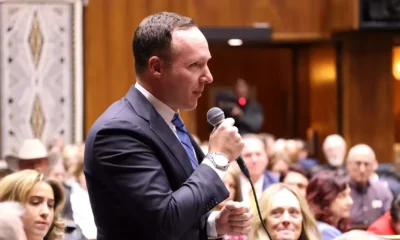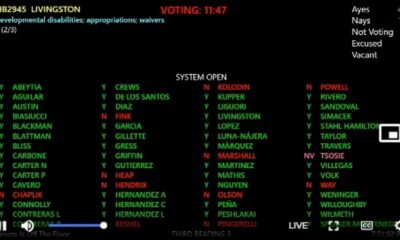bipartisan
Bipartisan Legislation Secures Funding for Disabilities Agency Ahead of Critical Deadline

The Arizona Legislature has successfully passed a bipartisan funding bill for the Division of Developmental Disabilities (DDD) prior to a critical financial shortfall. Legislators from both parties collaborated to secure the necessary $122 million to ensure the program’s viability, especially with the impending deadline of May 1 fast approaching.
The urgency of this measure was underscored by Governor Katie Hobbs, who publicly supported the funding initiative after previous partisan disagreements. Approximately 60,000 residents rely on DDD services, making immediate action essential to avoid disruption.
Key negotiations were spearheaded by prominent women leaders from both House majority and minority caucuses. House Majority Whip Julie Willoughby, a Republican, along with Assistant Minority Leader Nancy Gutierrez, a Democrat, played pivotal roles in achieving consensus after two weeks of contentious discussions.
The emergency supplemental House Bill 2945 was passed with overwhelming support in both chambers, despite initial uncertainty surrounding its future when the House convened on April 23. Governor Hobbs had previously threatened to veto an earlier version of the bill, which had garnered solely Republican votes.
Negotiations took a decisive turn when Gutierrez and Willoughby met after a House recess to address the division among their ranks. They prioritized collaboration over ego, which Gutierrez noted was crucial for the bill’s eventual success.
Later that evening, the House reconvened and passed the bill with a decisive 48-11 vote. Representative Matt Gress expressed satisfaction with the outcome, emphasizing the importance of swift action to secure funding for families in need.
While some House Republicans previously resisted bipartisan amendments proposed by Willoughby during committee discussions, her persistence was acknowledged by colleagues, including Representative Jeff Weninger, who commended her dedication to the issue.
Governor Hobbs reinforced the significance of the bill, declaring it a pivotal step towards restoring essential services for Arizonans with developmental disabilities. She highlighted the prior uncertainty faced by families and expressed gratitude for the cooperative spirit displayed by House members from both sides of the aisle.
Initially, concerns arose regarding a proposal to finance the shortfall by reallocating $38 million from the Housing Trust Fund. This fund has been integral in providing affordable housing since 1988, prompting apprehension about potential legal repercussions for the state. Ultimately, the funding gap will be addressed through the Prescription Drug Rebate Fund, which possesses adequate resources for the DDD without compromising housing initiatives.
The finalized bill accommodates a weekly cap of 40 hours for the Parents as Paid Caregivers program, which faced pushback from Democratic lawmakers advocating for family needs. The agreement also introduces an electronic verification system managed by the Department of Economic Security, enhancing oversight of the program.
House Speaker Steve Montenegro recognized the collaborative effort to protect essential services and improve fiscal accountability. He noted that the legislation reflects a commitment to responsible management of public funds.
In conjunction with the new funding, the bill includes provisions for a $355,000 allocation to the Auditor General’s Office for an audit of the Parents as Paid Caregivers program, highlighting Republican concerns regarding its rapid enrollment growth since its inception during the COVID-19 pandemic.
As the Senate passed the bill 28-1 the following day, lawmakers were hopeful that the lessons learned during these negotiations would foster improved collaboration in future legislative endeavors. Gutierrez asserted that women-led initiatives have successfully navigated challenges, urging continued cooperation between factions inclined towards conflict.


















